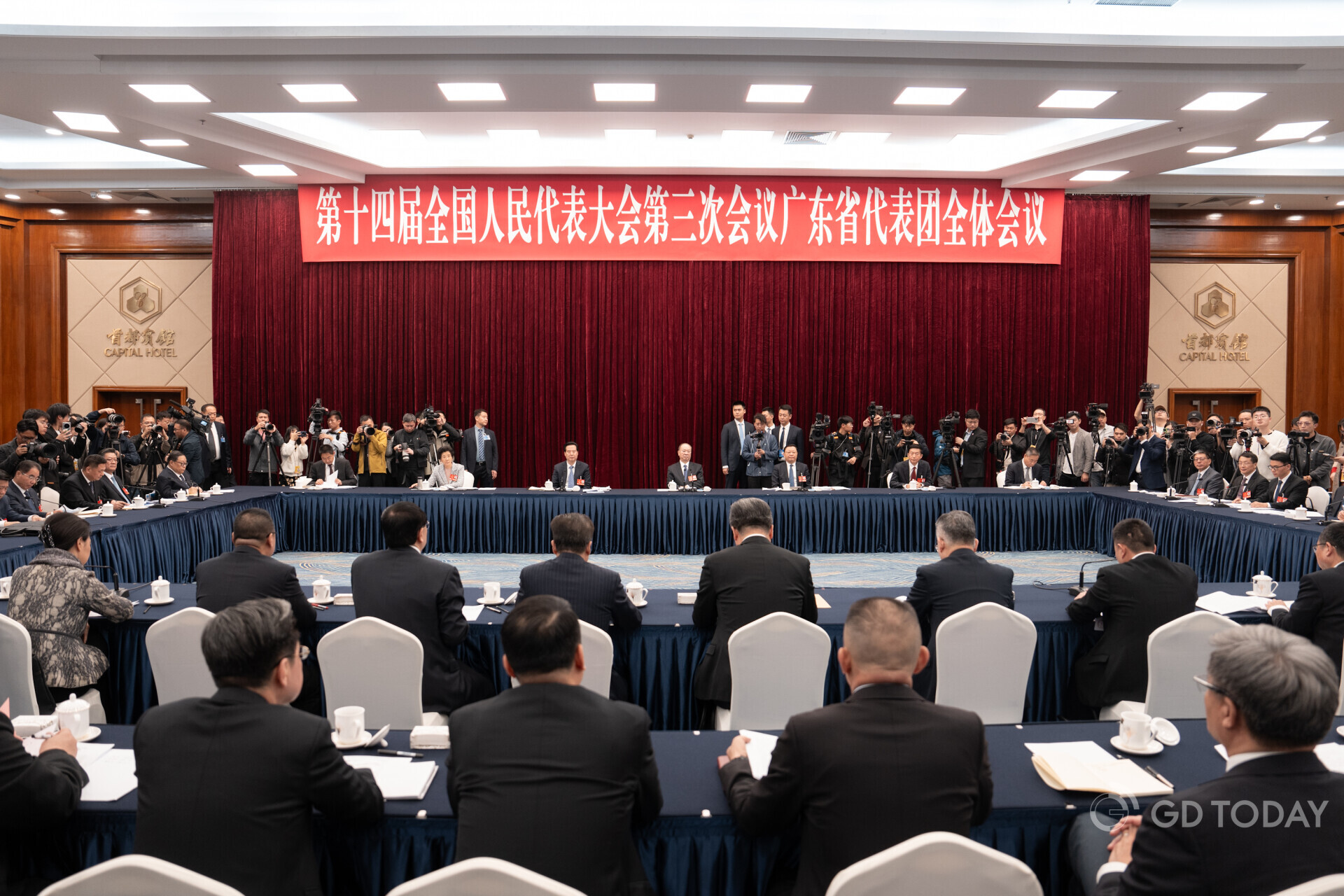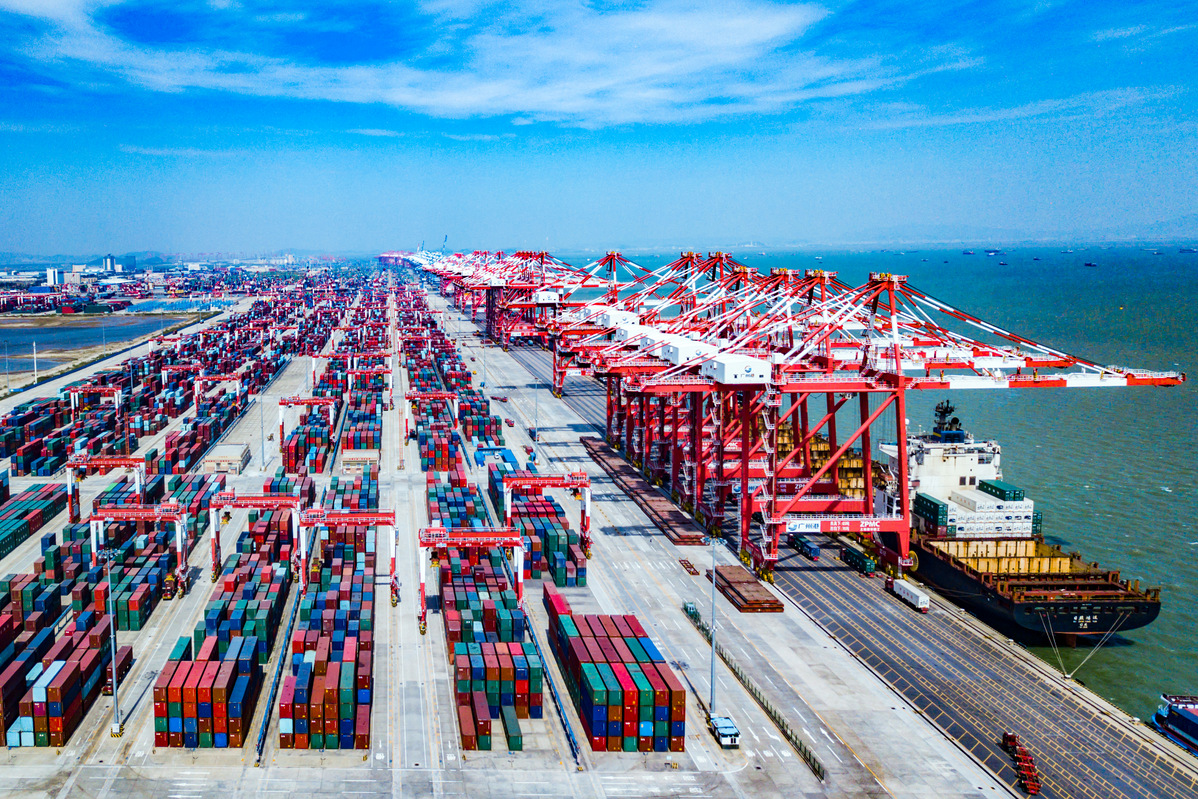As China's "two sessions" unfold, Guangdong—the country's most economically developed province—has once again drawn considerable attention.
The Guangdong delegation's open day in Beijing on Thursday provided valuable insights into China's political processes and economic strategies.
The event, essentially a panel discussion, featured National People's Congress (NPC) deputies from Guangdong deliberating on the Government Work Report, sharing perspectives, and submitting suggestions on key issues.
It's also a platform for media engagement, attracting over 260 journalists from China and around the world.

(Photo: Zhang Zijian)
Guangdong's crucial role
Huang Kunming, Secretary of the CPC Guangdong Provincial Committee, highlighted that Guangdong boasts a vast and comprehensive industrial system.
Guangdong covers all 31 major manufacturing categories and hosts nine trillion-yuan industrial clusters. Following the automotive industry's rise to this level in 2023, the new energy sector became the ninth such cluster in 2024.
Huang noted that Guangdong also excels in innovation, supported by national laboratories and advanced research facilities.
"With a dynamic market and a population of 127 million, the province provides a fertile ground for enterprises to thrive and transform ideas into products and services," said Huang.

(Photo: China Daily)
As China continues to advance its economic transformation, it is believed that Guangdong's policies and initiatives will play a crucial role in shaping the country's technological and industrial landscape.
Huang Kunming stated that a new round of technological revolution presents a major opportunity for Guangdong to embrace the wave of technology and lead industrial development. "It is crucial to seize this opportunity and take proactive actions."
Focus on emerging industries
"We should accelerate the development of emerging and future industries," said Wang Weizhong, Governor of Guangdong.
Qin Weizhong, Mayor of Shenzhen, emphasized the importance of sectors such as artificial intelligence, robotics, the low-altitude economy, and aerospace. "We must fully commit to competing in these new fields to secure a competitive edge," he stated.

(Photo: Xinhua)
The province's strength in industrial innovation was underscored by Chen Zhilie, Chairman of the Guangdong Federation of Industry and Commerce.
"One in every three industrial robots in China is manufactured in Guangdong," Chen highlighted. "AI-powered industrial products are making a significant contribution to the province's GDP, tax revenue, and high-end employment."
Wu Fengli, Chairman and President of Guangdong Topstar Technology, stressed the importance of industrial applications for intelligent and humanoid robots. "This is the pathway to overcoming technical bottlenecks and transitioning from standardized to complex scenarios," he explained.
He further elaborated that robots, as a key driver of intelligent upgrades in manufacturing, are integrating deeply with AI technology. "This fusion is extending artificial intelligence beyond the digital realm into the physical world, positioning robotics as a crucial element in AI's evolution."
Greater Bay Area integration
Another key topic of discussion was the integration of the Guangdong-Hong Kong-Macao Greater Bay Area (GBA).
This year marks the sixth anniversary since the country introduced the Outline Development Plan for the Guangdong-Hong Kong-Macao Greater Bay Area (GBA), a visionary blueprint document that positioned the area as a vibrant world-class city cluster.

(Photo: Xinhua)
Tang Hongwu, President of South China University of Technology, stressed the need for a new mechanism to cultivate tech talent in collaboration with Hong Kong and Macao.
Huang Xiqin, President of the Guangdong New Social Stratum Association, proposed facilitating inter-regional professional qualification recognition.
She suggested that professionals in legal, accounting, valuation, taxation, intellectual property, and patent services from Hong Kong and Macao be allowed to practice in the Chinese mainland.
This move, she argued, would promote greater regional synergy and strengthen the professional services sector in the GBA.
Additionally, discussions touched on improving infrastructure connectivity within the GBA, such as enhancing transportation networks and fostering deeper financial cooperation between the three regions.
Talent Programs
At the event, Huang Kunming, Secretary of the CPC Guangdong Provincial Committee, extended an invitation to young professionals and entrepreneurs, emphasizing the province's commitment to talent development.
He also announced that large-scale spring job fairs will be held nationwide following the "two sessions" to recruit new graduates.
Cities like Guangzhou and Shenzhen will introduce a series of incentives to attract top talent, including housing subsidies, research grants, and streamlined residency policies.
"We welcome more talents to grow and thrive in Guangdong no matter where they are from," Huang said.
Guo Yonghang, Secretary of the CPC Guangzhou Municipal Committee, reaffirmed the city's ambition to establish a high-level talent hub in the Greater Bay Area.
"It is important to provide strong support for professionals engaged in research and innovation, ensuring that skilled workers can thrive in an environment that encourages long-term career development," said Guo.
Tang Hongwu further suggested upgrading academic disciplines to align with the AI and robotics industries.
He advocated for high-level, interdisciplinary talent training programs under initiatives like "AI+" and "Robotics+" to cultivate a workforce capable of driving future technological advancements.
Reporter | Xie Hongzhou
Editor | Ouyang Yan, James, Shen He
















